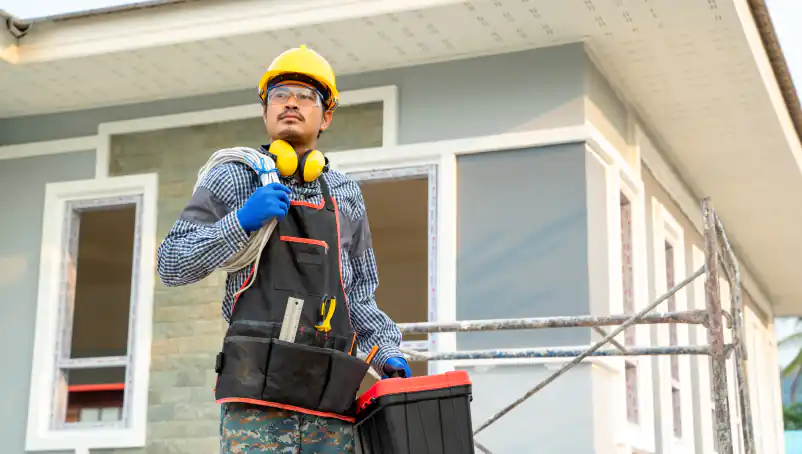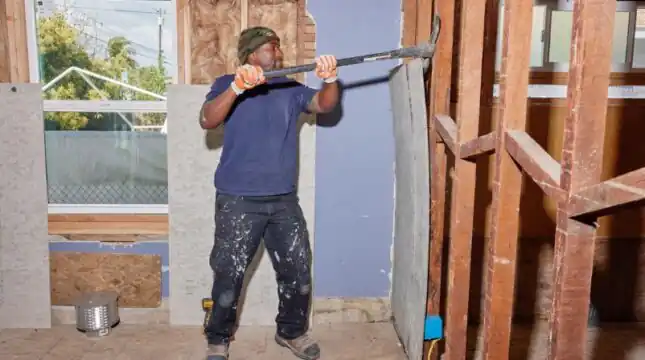How to register as a home improvement contractor in New Jersey
The Contractors’ Registration Act requires anyone working as a general contractor in New Jersey to register with the Division of Consumer Affairs. This includes any type of business owner, such as sole proprietorship, full-time and part-time employees, sub-contractors and out-of-state contractors who work in New Jersey.
The law applies to people doing the following types of work on residential or noncommercial buildings:
- Construction
- Renovations and remodeling
- Restorations and repairs
- Modernizing
- Installing
- Demolishing
To register with the state, you must submit an application, a certificate of liability insurance, and a $110 fee to the New Jersey Division of Consumer Affairs.
Depending on your business structure, you may also need to submit your trade name certificate, certificate of incorporation, certificate of formation or registration of an alternate business name. If you formed your business in a state other than New Jersey, you must provide a certificate of authority showing you have permission to work in New Jersey.
The state will issue you a registration number if your application is approved. You must include the number in all advertisements, business documents, contracts, correspondence with customers, and on all commercial vehicles. You must also display your original registration certificate at your place of business.
If you offer customers financing options for their home construction or improvement projects, you may also need to obtain a home repair contractor license through the state’s Department of Banking and Insurance.
What work requires registration — and what doesn’t?
Whether you need to register with the state of New Jersey depends on the type of property you work on and services you offer. Understanding this distinction is important, especially for contractors who take on a mix of residential and commercial projects.
Generally, the state’s registration requirement applies to home improvement work performed on residential or noncommercial properties. Commercial-only work typically falls outside the statewide registration requirement, though local rules may still apply.
Work that requires state registration
You’re generally required to register with the New Jersey Division of Consumer Affairs if you perform home improvement work on residential buildings. This includes activities such as construction, remodeling, renovations, repairs, installations and demolitions.
Unlike some states, New Jersey does not set a minimum project value (for example, $500 or $1,000) for contracting. If the work qualifies as home improvement work and is performed on a residential or noncommercial property, state registration is usually required regardless of the job’s dollar value.
The requirement applies regardless of your business structure and includes sole proprietors, LLCs, corporations, subcontractors, and out-of-state contractors performing covered work in New Jersey.
Work that typically does not require state registration
If you work exclusively on commercial properties, the state’s home improvement contractor registration requirement usually does not apply. However, many cities and municipalities have their own contractor licensing, registration, or permitting rules for commercial work.
Contractors performing commercial-only projects should always check local requirements before starting work.
Mixed-scope businesses (residential and commercial work)
What if you work on both types of structures? If your business performs any residential home improvement work, even occasionally, registration with the state is generally required.
Contractors who switch between residential and commercial projects often choose to register to avoid compliance issues when bidding or pulling permits.
Specialty trades and limited-scope work
Certain licensed professionals — such as plumbers, electricians, HVAC technicians, engineers, or other regulated trades — may not need to register as home improvement contractors as long as their work stays within the scope of their existing license. If that work expands into broader home improvement services, you may need to register.
Penalties for working without a general contractor license
If you work without meeting the requirements of a general contractor license in New Jersey, you could face some steep penalties, including jail time and a $10,000 fine for your first offense and $20,000 for each additional violation. Plus, municipalities aren’t allowed to issue construction permits to contractors who aren’t registered with the state.
Exceptions to licensing requirements
While most contractors are required to register, there are a few exceptions.
People doing work on their own homes, a family member’s home, or a charity or other non-profit organization don’t need a license. If you hold a specialized license (e.g., plumber, electrician, architect, engineer, etc.), you don’t have to register with the state as a home improvement contractor as long as your work is within the scope of the license you already have.
Home improvement retailers with a net worth of $50 million or more, as well as people handling maintenance for public utilities or community associations, are exempt from the registration requirement.
New Jersey general contractor license requirements for commercial work
Requirements for commercial contractors may vary by location, so it’s important to check with your local government for licensing guidelines. Here are a few examples of what you might expect when you apply for a commercial contractor license in your area.
Newark
If you plan to work as a building contractor in Newark, you need a license to get started. To obtain licensure, you must submit an application to the Director of Finance along with:
- A copy of your driver’s license or state ID card
- Your New Jersey business registration certificate
- A police warrant record check and state bureau of investigation report
- Certificate of incorporation of partnership formation
- Proof of payroll
The application fee starts at $200, which you must include with your application.
Passaic
You must be a licensed contractor by the City of Passaic Construction Department if you want to work as a commercial contractor in Passaic. You must send an application and a $100 fee to apply for a license.
The application requires you to choose a contractor classification, such as general contractor, demolition, swimming pool, roofing and siding, sign and billboard, or another type of contractor. It must also include the principal officer’s name if you apply under a corporation, company, or partnership, and proof of liability insurance.
Atlantic City
Atlantic City requires commercial contractors to have either a Class I or Class II construction contractor license. Before applying for a license, you must pass an exam to demonstrate you’re qualified to be a commercial contractor.
If you pass the exam, you must submit your license application and the following documents to the city’s Mercantile office:
- Proof of liability insurance of at least $1 million per occurrence
- An affidavit stating you’re an equal-opportunity employer
- A $600 fee if you’re applying for a Class I license and a $300 fee if you’re applying for a Class II license
Insurance requirements for New Jersey contractors
If you’re working as a general contractor, here’s what you need to know about the types of New Jersey business insurance you may be required and recommended to maintain.
General Liability insurance
To register with the state as a general contractor, you must have NJ general liability insurance of at least $500,000 per occurrence.
General liability insurance helps protect your business from expenses related to property damage and injuries to people other than you and your employees. For example, if you’re remodeling a client’s home and you or an employee break a window, general liability insurance can help pay to repair the damage.
Learn more about general liability for contractors.
Workers’ Compensation insurance
The state of New Jersey requires businesses with at least one employee not covered by a federal program to have workers’ compensation insurance or be approved for self-insurance. Out-of-state employers may also need to purchase workers’ compensation insurance if they work in New Jersey.
Workers’ comp coverage helps pay for medical expenses and time missed from work if an employee is hurt on the job.
Learn more about Workers’ Comp for construction workers.
Tools and Equipment insurance
Tools and equipment insurance is important to general contractors in New Jersey. It protects against financial losses if tools and equipment are stolen, damaged, or destroyed. It also helps cover the costs of repairs or replacement if necessary.
For example, if your trailer containing expensive tools and equipment was broken into, and the items were stolen, the insurance could help cover the cost of replacing the equipment.
Commercial Property insurance
Fire, theft, vandalism and other damage can happen when you least expect it. Commercial property insurance for general contractors can help. It covers property you own and rent for your contracting business.
Commercial Auto insurance
Do you have a van or truck to haul supplies and equipment back and forth to job sites? If so, commercial auto insurance can help pay for expenses related to injuries and or damage sustained in an accident.
If you’re driving for business reasons, your personal auto insurance most likely won’t cover expenses if you get in an accident. It’s important to review your policy documents closely.






